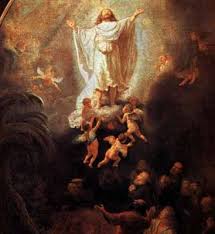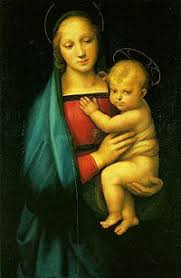tubae, alleluja." -- Psalm 46:6
 The Feast of the Ascension reminds us of the pledge of our salvation that is ours through Christ. It brings to mind the thought, echoed somewhere in St. Athanasius, that as God became man in Christ without losing His divinity, so we shall become partakers of the divine nature (1 Peter 1:4) without losing our humanity. Why? Because in the Ascension, He elevates our humanity in His own Person to the right hand of God the Father.
The Feast of the Ascension reminds us of the pledge of our salvation that is ours through Christ. It brings to mind the thought, echoed somewhere in St. Athanasius, that as God became man in Christ without losing His divinity, so we shall become partakers of the divine nature (1 Peter 1:4) without losing our humanity. Why? Because in the Ascension, He elevates our humanity in His own Person to the right hand of God the Father.Two things struck me at the Mass of the Ascension today, which in the old calendar is not moved to the closet Sunday for those who find the joy of assisting at Mass on a weekday an inconvenience. The first was our priest's homily, about which I will say more momentarily. The second was the delight of singing Salve Regina coelitum in the traditional Latin.
What struck me about the homily was Father's exceptional giftedness, of which he probably is not in the least conscious. As far as he's concerned, the impression I get is that he just sees himself as having a job to do, and he does it. But the remarkable thing is how well he does it. It is not just that he is utterly fearless in preaching those things that we Catholics need to hear but too often don't, even at the risk of stepping on toes. That alone would make such a priest an exceptional gift to any parish. Rather, what I have in view here is his natural gift for communicating important things in a simple and accessible way.
In this evening's homily he pulled together in a neat synthesis a remarkable number of items from the liturgical calendar, traditional devotions, biblical exposition, and hortative applications. He began by noting that in the calendar of the Extraordinary Form of the Roman Liturgy, Ascension Thursday falls precisely 40 days after Easter, just as Jesus, according to the New Testament narratives, remained for 40 days with His Apostles before His Ascension.
Tomorrow begins the mother of all novenas, the Novena to the Holy Spirit, the most ancient of novenas, culminating in the descent of the Holy Spirit upon the Apostles and Blessed Mother at Pentecost, exactly ten days hence. As the Catholic Encyclopedia says:
... for every novena of preparation, as also for every novena of prayer, not only the best explanation but also the best model and example was given by Christ Himself to the Church in the first Pentecost novena. He Himself expressly exhorted the Apostles to make this preparation. And when the young Church had faithfully persevered for nine full days in it, the Holy Ghost came as the precious fruit of this first Christian novena for the feast of the establishment and foundation of the Church.St. Luke records in Acts 1:1-11 (the Epistle for today) that Jesus "commanded them that they should not depart from Jerusalem, but should wait for the promise of the Father." What follows upon this awaited promise of the Holy Spirit? Authority and power. Before His Ascension, Jesus says: "... you shall receive the power of the Holy Ghost coming upon you, and you shall be witnesses unto Me in Jerusalem, and in all Judea and Samaria, and even to the uttermost part of the earth." Likewise, St. Mark 16:14-20 (the Gospel for today) juxtaposes the new signs and wonders that the Apostles may expect to perform with the imperative: "Go ye into the whole world and preach the Gospel to every creature. He that believeth and is baptized shall be saved: but he that beliveth not shall be condemned."
Thus the liturgical feast days, the traditional novena, and Biblical texts fit together seamlessly. What made the homily exceptional, however, was the way Father developed the Biblical narrative in experiential terms that helped it come alive. While I cannot hope to reproduce his homily with all his illustrations properly connect here, I offer a few thoughts in following.
How indescribably stunning the rapid succession of these events must have been for Jesus' little band of Apostles: He rises from the dead; and as if that weren't enough to keep them reeling in vertigo, forty days later He ascends from the earth and disappears into the heavens! How dizzying it must have been for them.
In the interval, Jesus spent forty days with them, but they did not at first fathom the reality of His Resurrection. Jesus once appeared to them after a night of fishing on the Sea of Tiberias, in which they caught nothing; but they did not recognize Him. St. John writes: "Early in the morning, Jesus stood on the shore, but the disciples did not realize that it was Jesus" (Jn. 21:4). Only after Jesus tells them to cast their nets on the other side of their boat, and their nets were miraculously filled to overflowing, did John say to Peter: "It is the Lord!" and Peter jumped into the water and rushed to Him. "When they had landed, they saw a fire of burning coals there with fish on it, and some bread," writes John (v.9). Remarkable: Jesus fixed them breakfast and had it waiting for them!
This was the third time that Jesus had appeared to them, and yet they had trouble believing that He had truly risen. Then, only a week or two later, Jesus stood before them on a mountain, and, having finished instructing them, was lifted up before them and ascended into Heaven.
One of the themes Father developed was that of parting -- of all good things coming to an end. Once it sank into their heads that Jesus had really returned to them from the dead, the Apostles must have found the departure of Jesus a precipitous and shocking disappointment. How often do we, too, find ourselves dreading the moment when some pleasant experience draws to a close, when friends, family members, or relatives must leave or be parted from one another. The son or daughter must go off to kindergarten, and the mother feels the pangs of sadness at the parting, no less than the child. A vacation draws to a close. The festivities of a Polish Christmas Eve or family reunion comes to an end, and grandmother and grandfather, or grandchildren, must leave. Then, of course, there is the ultimate separation of death.
What we have difficulty grasping, however, is the greater good that comes only via these partings. The kindergartener graduates and moves on through successive grades in order to grow into a mature adult. Jesus leaves His followers and ascends to Heaven, in order that He might send us the gift of the Holy Spirit. The final separation of death is but a prelude to the Eternal Reunion of the heavenly family. As C.S. Lewis once put it, when seeing off a friend in a crowded London train station, having turned and walked across the street through the crowd, and turning again to shout back at his friend over the mass of heads between them: "Christians never have to say Goodbye!"
Salve Regina coelitum
1. Sálve Regína coélitum,
O María. Sors única terrígenum,
O María.
Jubiláte Chérubim,
exsultáte Séraphim,
consonáte pérpetim.
Sálve, sálve, sálve Regína.
2. Máter misericórdiae,
O María. Dúlcis párens cleméntiae,
O María. Jubilate ...
3. Tu vítae lux, fons grátiae,
O María. Cáusa nóstrae laetítiae,
O María. Jubilate ...
4. Spes nostra, salve, Domina
O Maria. Exstingue nostra crimina!
O Maria. Jubilate ...


No comments:
Post a Comment